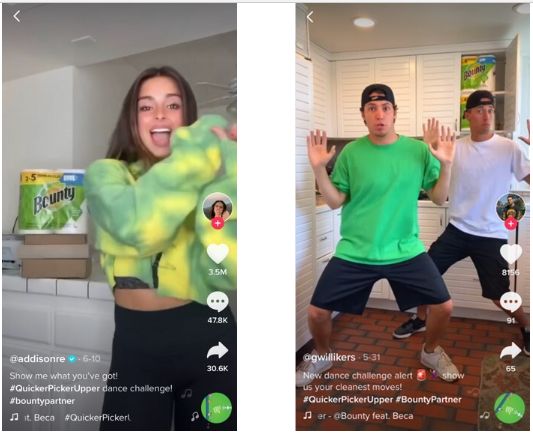In a recent decision arising from its routine monitoring of social media advertising and promotions, the National Advertising Division ("NAD") voiced concerns over video advertisements by The Procter & Gamble Company ("P&G") featuring Bounty paper towels.
The videos, originating on TikTok, feature influencers taking part in a challenge in which they dance, clad in neon green apparel, to an admittedly catchy song called "Quicker Picker Upper" – the product of a collaboration between Bounty and singer, Beca. Bounty paper towels appear in various places in the background of the videos, and the lyrics inspire listeners to "clean up your life." Examples of the videos posted by influencers Addison Rae (@addisonre) and Gage Williams (@gwillikers) are below:

When the videos appear on TikTok, they include a #BountyPartner
disclosure to alert users to the material connection between the
influencers and P&G. However, when shared to other social media
platforms, the disclosure does not always appear, prompting NAD to
raise concerns. For example, while the disclosure appears when
shared to Facebook, it does not appear when shared to Instagram. As
a result, Instagram users who come across the videos are not
informed of the paid sponsorship, as required by the Federal Trade
Commission. The Commission's latest guidance for social media
influencers provides that when "making an endorsement in a
video, the disclosure should be in the video and not just
in the description uploaded with the video."
In June, Forbes posted an article describing this branded-content disclosure loophole, and P&G explained the phenomenon to NAD in its response. It stated that in comparison to other platforms that automatically share disclosure language along with the underlying content, "TikTok allows users to share content across platforms without any contextualizing text or disclosures."
P&G admitted it was initially unaware the failure of the disclosures to follow the video, but stated that, once aware, it began requiring influencers to embed the disclosures in their videos to ensure they would transfer when shared to other platforms. Accompanying this explanation, P&G provided examples of updated videos which included the required embedded disclosures and a promise to ensure that all future Bounty-sponsored TikTok content complied with the requirements. Based on the FTC's latest guidance, NAD determined that P&G's proactive efforts to ensure the material connection disclosures were embedded in the videos themselves quickly picked up the mess.
The case is: NAD v. The Procter & Gamble Company, Bounty Paper Towels, Case No. 6403 (Aug. 28, 2020).
Originally published by Finnegan, September 2020
The content of this article is intended to provide a general guide to the subject matter. Specialist advice should be sought about your specific circumstances.

